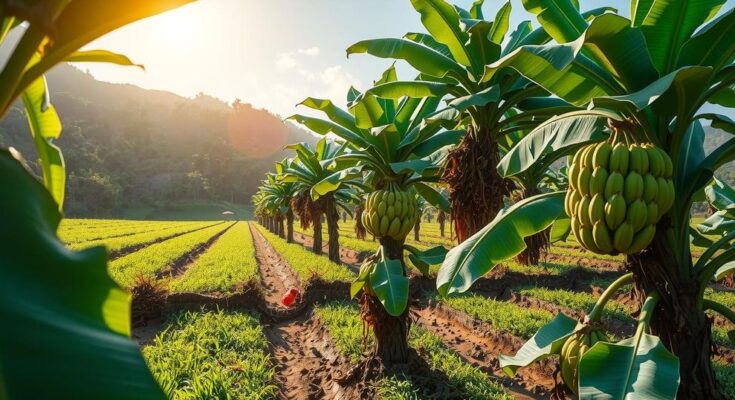Tropical crops such as coffee, rubber, and cocoa are experiencing significant price increases, yet smallholder farmers are facing challenges due to climate change. Weather extremes are disrupting production in key growing regions, leaving farmers unable to capitalize on rising prices. The financial viability of smallholders is in jeopardy, limiting their capacity for climate adaptation and investment, while profits are largely captured by traders.
The prices of tropical crops, including coffee, rubber, and cocoa, have significantly increased; however, smallholder farmers are struggling to reap the benefits due to the adverse impacts of climate change. These crops are highly sensitive to weather fluctuations, which are intensifying globally, thus exacerbating the challenges faced by farmers. While commodity traders are profiting from the price surges, smallholders remain vulnerable, unable to utilize rising prices to enhance their livelihoods effectively.
Production of tropical crops is concentrated among just a few nations—Brazil, Indonesia, Ivory Coast, Malaysia, Thailand, and Vietnam—making global supplies especially susceptible to regional adverse weather events. Severe drought in Brazil is affecting coffee production, while excessive rainfall in West Africa and Southeast Asia is damaging cacao and rubber crops. As climate change continues to intertwine global weather patterns, these vulnerabilities are only expected to escalate.
Tropical crops are more delicate than those grown in temperate regions, suffering particularly from the elevated temperatures associated with climate change. Research indicates that by 2070, many tropical plant species will face conditions too severe for their seeds to germinate. This growing threat extends to various fruits, including bananas, mangoes, and papayas, which are becoming increasingly vulnerable.
Moreover, the long cultivation cycles of tree crops hinder farmers’ ability to adjust planting strategies based on shifting climate conditions. Unlike more adaptable crops, which include corn and soybeans, tropical tree crops require decades to mature, thus limiting immediate responses to climatic challenges. As climate conditions change unpredictably, these crops are likely to fare poorly.
The financial realities of smallholder farmers, who form the backbone of tropical crop production, further complicate the situation. With the majority of these farmers subsisting on less than $2.15 daily, investments in climate adaptation are often unattainable. Although rising commodity prices could encourage investment, smallholders usually receive only a fraction of these gains, with the majority going to processors and traders, leaving them without much financial relief.
In conclusion, while the prices of tropical crops have surged, smallholder farmers face significant struggles against the backdrop of climate change and its associated impacts. The concentration of crop production in a few countries, coupled with severe climate vulnerabilities and economic limitations, means that these farmers are unlikely to benefit from the current commodity price boom. As climate challenges grow, the disparity in profits between traders and farmers highlights the need for a more equitable system to support those who cultivate these essential crops.
Original Source: www.biznews.com




